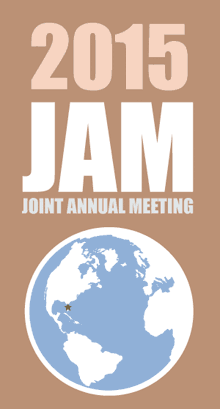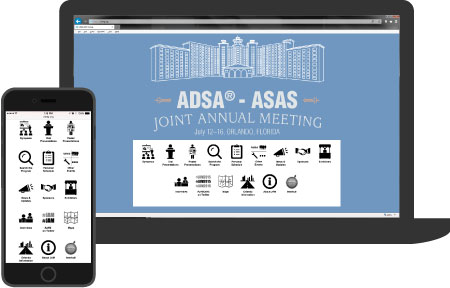

Program
MyProgram

To help you get started planning your JAM 2015, the JAM website now includes the fully redesigned MyProgram. The revamped MyProgram now functions as a scheduling assistant and includes abstracts for all scientific sessions, as well as general meeting information, times and locations of special events, exhibitor details, invited speaker bios, and more. MyProgram allows you to
- Navigate the entire scientific program, optimized for your mobile device, laptop, or desktop computer
- View the schedule ahead, with MyProgram displaying in real time
- Search the entire program with just a few keystrokes
- Set up a personalized schedule of presentations and events you want to attend and posters you want to see
- Transfer your personal schedule between devices for easy viewing anywhere on nearly any device
Start planning now by going to http://m.jtmtg.org
Program Schedule Grid
Sunday, July 12, 2015
| Morning | Afternoon |
|---|---|
| Teaching Workshop: Changing the animal science teaching and learning paradigm—An interactive workshop on how to use case study teaching to foster critical thinking and classroom discussion | |
| Breeding and Genetics Symposium: Joint Interbull/JAM Session: Milk spectral data—Cost-effective information to improve expensive and limited traits in dairy cattle breeding (8:30 am–12:00 pm) | Breeding and Genetics Symposium: Joint Interbull/JAM Session: Use of genomics to improve limited and novel phenotypes in animal breeding (2:00–5:00 pm) |
| Triennial Reproduction Symposium: Developmental programming of fertility | |
| Late-Breaking Original Research Session | |
Monday, July 13, 2015
| Morning (3 hours) | Afternoon (3 hours) |
|---|---|
| Poster Session (Authors present 7:30-9:30) | |
| Bioethics Symposium: Effects of science, government, and the public in directing the future of animal agriculture | ADSA Foundation PhD Symposium: Meeting the present and future demand for employees with a PhD |
| Breeding and Genetics Symposium: Relevance of modeling in the genomics era | ADSA Multidisciplinary and International Leadership Keynote (MILK) Symposium: Global dairy perspective—Production, processing, people, politics, and priorities |
|
Comparative Physiology of Lower Gut and Nonruminant Nutrition Symposium: The gut–brain axis—Sensing and signaling |
|
| Extension Education Symposium: Extension and industry outreach for tomorrow’s producers | ADSA Southern Section Symposium: Maximizing forage quality in the Southeast |
| Lactation Biology Symposium: Mammary gland biology revisited | Animal Behavior and Well-Being Symposium: Novel and multidisciplinary approaches to animal welfare |
| ADSA-SAD (Student Affiliate Division) Undergraduate Competition: Dairy Foods | Animal Health Symposium: Understanding and reducing the impact of various stressors on immune responses and health of cattle |
| Animal Health: Reproductive Health & Acute Immune Responses |
Bovine tuberculosis (TB) and paratuberculosis (Johne’s disease) Symposium— |
| Forages and Pastures: Forages for Livestock Systems | EAAP Genetics Symposium: Breeding for environmental sustainability |
| Graduate Student Competition: ADSA Dairy Foods Graduate Student Oral Competition | Physiology and Endocrinology Symposium: Progesterone as an endocrine regulator of fertility in cattle |
| Graduate Student Competition: ADSA Production Division Graduate Student Oral Competition, MS | Ruminant Nutrition Symposium: Time required for diet adaptation and minimization of carry-over effect in ruminants: Evidence-based decisions |
| Graduate Student Competition: ADSA Southern Section Graduate Student Oral Competition | ADSA-SAD (Student Affiliate Division) Undergraduate Competition: Dairy Production |
| Meat Science and Muscle Biology | ADSA-SAD (Student Affiliate Division) Undergraduate Competition: Original Research |
| Nonruminant Nutrition: Enzymes & Processing | Animal Health: Swine Health & Transition Cows |
| Physiology and Endocrinology: Reproduction and estrous synchronization | Forages and Pastures: Grasses and Silages |
| Production, Management, and the Environment I | Graduate Student Competition: ADSA Production Division Graduate Student Oral Competition, PhD |
| Ruminant Nutrition: Dairy Calves | Graduate Student Competition: ADSA-ASAS Northeast Section Graduate Student Oral Competition |
| Ruminant Nutrition: Dairy Rumen Fermentation | Horse Species-1: General session |
| Small Ruminant: Nutrition | Lactation Biology I |
| Swine Species | Nonruminant Nutrition: Amino Acids & Minerals |
| Physiology and Endocrinology: Nutrition, reproduction and metabolism | |
| Ruminant Nutrition: General | |
Tuesday, July 14, 2015
| Morning (3 hours) | Afternoon (3 hours) |
|---|---|
| Poster Session (Authors present 7:30-9:30) | |
| ARPAS Symposium: Reproductive efficiency of beef cows—Current status and new technologies | ADSA Production Division Symposium: The rumen and beyond—Nutritional physiology of the modern dairy cow |
| ADSA Production Division Symposium: Production efficiency of the dairy cow | Beef Cattle Nutrition Symposium: Feeding Holstein steers |
| Beef Species Symposium: Keeping beef in the center of the plate—Meeting consumer demand in a period of reduced cattle numbers and increased prices | Companion Animals Symposium: Bioenergetics of pet food |
| Cell Biology Symposium: Regulation of growth through amino acid sensing | Contemporary and Emerging Issues and International Animal Agriculture Symposium: Ahead to 2050—Global livestock production challenges: Current status, future needs, production obstacles |
| Forages and Pastures Symposium: Implications of climate change on the resiliency of forage and pasture production systems | Dairy Foods Symposium: Recent developments in manufacturing and applications of lactose and lactose derivatives |
| Horse Species Symposium: Exercise physiology of the horse |
Teaching/ |
| Milk Protein and Enzymes Symposium: High milk protein foods—Challenges and opportunities in structures and digestion | Animal Behavior and Well-Being I |
| Animal Health: Transition Cow Health | Animal Health: Beef Cattle Health, Lameness & Mastitis |
| Breeding and Genetics: Application and Methods - Dairy I | Breeding and Genetics: Feed Efficiency and Methods |
| Companion Animals: Nutrition and Behavior | Breeding and Genetics: Genomic Methods |
| Dairy Foods: Microbiology | Dairy Foods: Cheese & Chemistry |
| Extension Education | Nonruminant Nutrition: Feed Ingredients |
| Food Safety | Physiology and Endocrinology: Gametes and stress |
| Growth and Development I | Production, Management, and the Environment II |
| Lactation Biology II | Ruminant Nutrition: Manipulating Rumen Function |
| Physiology and Endocrinology: Reproduction in cattle | Ruminant Nutrition: Protein Metabolism |
| Ruminant Nutrition: Amino acids and metabolism | Small Ruminant: General |
| Ruminant Nutrition: Dairy | |
|
Teaching/ |
Wednesday, July 15, 2015
| Morning (2 hours) | Afternoon (3 hours) |
|---|---|
| Poster Session (Authors present 7:30-9:30) | |
| Mixed Models Workshop | |
| ASAS Graduate Student Symposium: Networking to achieve interdisciplinary research | ADSA-ASAS Northeast Section Symposium: Bridging the gap between animal protein production and consumers, current and future |
|
Dairy Foods Symposium: Advances in bacterial exopolysaccharides— |
Animal Health Symposium: Maintaining animal health in organic dairy herds |
|
Growth and Development Symposium: The mitochondrion—A powerhouse for the cell or a key to animal productivity? |
|
| Horse Species Symposium: Recent advances in the micro-biome and physiology of the hind-gut of the horse and dog | Companion Animals Symposium: Comparative nutrition—Protein and energy across species |
| Small Ruminant Symposium: Genetic improvement in small ruminants for the future | Dairy Foods Symposium: Processing and ingredient innovations to grow fluid milk sales |
| Breeding and Genetics: Beef and Meat Species | Physiology and Endocrinology Symposium: Insulin revisited |
| Dairy Foods: Processing & Chemistry | Production, Management, and the Environment Symposium: Environmental footprint of livestock production—Greenhouse gas emissions and climate change |
| Physiology and Endocrinology: Estrous synchronization and metabolism | Animal Behavior and Well-Being II |
| Production, Management, and the Environment III | Beef Species I |
| Production, Management, and the Environment IV | Breeding and Genetics: Application and Methods - Dairy II |
| Ruminant Nutrition: Lactation Responses | Breeding and Genetics: Poultry and Swine |
| Ruminant Nutrition: Mineral nutrition | Milk Protein and Enzymes |
| Nonruminant Nutrition: Immune Support | |
| Production, Management, and the Environment V | |
| Ruminant Nutrition: Modifying Rumen Microbial Populations | |
Thursday, July 16, 2015
| Morning (3 hours) |
|---|
| Mixed Models Workshop (continued) |
| Nonruminant Nutrition: Fiber |
| Production, Management, and the Environment VI |
| Ruminant Nutrition: Dairy Rumen Metabolism |
Approved JAM 2015 Workshop List
Select a title below to view a brief description of the workshop.
Mixed Models Workshop
The Mixed Models Workshop provides a comprehensive exposition of proper statistical data analysis and power determinations of commonly used experimental designs in the animal sciences; our approach is example-driven and primarily based on the various mixed model analysis procedures available in SAS software.
Instructors
Nora Bello
Ken Koehler
Kevin McCarter
Teaching Workshop: Changing the animal science teaching and learning paradigm—An interactive workshop on how to use case study teaching to foster critical thinking and classroom discussion
The purpose of the case study workshop is to engage participants in different types of case study methods of instruction, demonstrate how to teach with case studies, and how to write cases and teaching notes so that others individuals can use them. During this highly interactive workshop, participants will experience case study teaching from the student’s viewpoint, and discuss how this teaching method can contribute to critical thinking and effective classroom discussions. In breakout sessions, participants will write their own cases or modify existing cases relevant to specific disciplines within the animal sciences undergraduate program (e.g., nutrition, genetics, management, physiology). This daylong workshop will be facilitated by Dr. Clyde (Kipp) Herreid, who is the founding director of the National Center for Case Study Teaching in Science (http://sciencecases.lib.buffalo.edu/cs/) and distinguished teaching professor of the State University of New York. Kipp has published over 150 articles and five books in the fields of ecology, behavior, and physiology of animals and written extensively in the field of science education.
Instructor
Clyde (Kipp) Herreid
